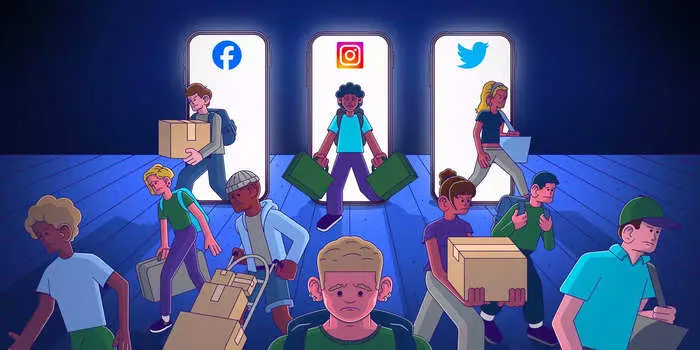I’ve significantly reduced my presence on social media in recent years. My last Instagram post was in December, my tweeting frequency has dropped from several times a day to a couple of times a week, and I haven’t logged into Facebook or Snapchat for a long time. Looking at my profiles, it appears as if they’ve been abandoned. I’m not alone—many people are spending less time on social media.
For over a decade, social media has been a means to connect people through major platforms like Facebook, Instagram, and Twitter. However, in the pursuit of rapid growth, these platforms have shifted from connecting people to becoming entertainment channels. As these major players have transformed into a chaotic mix of noise and sponsored content, disillusioned users are moving to a variety of other platforms.
Like many young individuals, I’ve found solace in small, private circles such as group chats. Within these smaller spaces comprising friends and family, I don’t feel the overwhelming pressure to overshare or constantly think about potential work opportunities. These safe havens are devoid of the constant stream of carefully curated content, advertisements, and brand promotions. Instead of the artificial experience of being in a shopping mall, group chats resemble a cozy dinner at a friend’s house.
Step into the ‘pluriverse’
“Major platforms like Facebook have moved away from their initial goal of “bringing the world closer together” and now prioritize profit-driven designs that keep users hooked and fuel growth,” said Ben Grosser, an artist and faculty associate at Harvard University’s Berkman Klein Center for Internet & Society. Numerous studies indicate that this shift in priorities by these companies has had a detrimental impact on everyday users.
For instance, recent research has shown that social media can lead to an increase in eating disorders and negative body image among both men and women. Additionally, by grouping people with differing views into a faceless mix, the technology that was intended to unite us has instead amplified polarization. In a broader sense, the always-on nature of social media is unnatural. We aren’t designed to communicate constantly, and sharing with thousands of people daily can erode our ability to communicate effectively.
Despite its drawbacks, I have relied on these major platforms. My work as a freelance journalist relies on a public audience and my ability to stay updated on developing news. Hence, the fatigue I feel is partly due to another pressing concern: Which social network should I rely on? It’s not that I don’t want to post; I simply don’t know where to do it anymore.
In the past year, I’ve helplessly moved with most of my network from one new platform to another — Discord, Bluesky, Threads, you name it. The pattern remains the same: I join the latest popular app, experiment with it for a few days, and then abandon it. While widespread platform shifts have occurred successfully over the years — I transitioned from Google’s Orkut, a popular platform in India and Brazil in the late 2000s, to Facebook, then to Instagram and TikTok — I’ve never before found myself in this uncertain position. If none of these platforms are poised to be the new Facebook, what does the future hold?
Chand Rajendra-Nicolucci, a researcher in digital public infrastructure at the University of Massachusetts Amherst, mentioned that a reboot is currently underway, and the future of social media might be “more private and more fragmented.”
In a white paper published earlier this year, he and his colleagues envisioned a “pluriverse” made up of existing platforms and a network of “very small online platforms” — private communities and specialized services that cater to intimate or interest-specific discussions not effectively served by today’s digital public sphere.”
The pluriverse, in a sense, is already a reality. Individuals engage with several social media apps, each serving a distinct purpose and audience. On “public” platforms like LinkedIn and X (formerly Twitter), I meticulously manage my online presence, utilizing them primarily for broadcasting public updates, promotions, and outreach.
However, when it comes to social interactions, I gravitate towards close-knit, private groups like iMessage threads and Instagram’s Close Friends list. Here, I can express myself more spontaneously and intimately. While this arrangement is functional for now, it’s more of a makeshift solution.
Online towns

No matter how enjoyable group chats and niche social apps like BeReal are, I’ve missed the expansive experience that large platforms offer—a space to discover trending content, grow my network, and engage in global conversations.
Rebecca Rinkevich, the director of the Institute for Rebooting Social Media, doesn’t expect giant social platforms to vanish soon, given their crucial role in everything from tracking natural disasters to activism.
However, as people’s attention spreads across numerous platforms, she believes “the government and the public will have to work harder to engage in dialogue online.
Mike McCue, Flipboard’s CEO, envisions the next significant social platform as one that combines the advantages of both worlds: “the quality and trust in small, transparent communities with the ability for those quality conversations to reach millions.
” Instead of one platform that suits everyone, the future of social media seems to be a network of platforms offering tailored experiences. The ideal system would allow you to transition to new social apps without losing your network or profile and interconnect them, enabling you to post on one and have a friend comment from another.
Consider Threads, Meta’s attempt to create a Twitter alternative. It operates on the ActivityPub protocol, implying that Threads’ 100 million-plus users will eventually interact with Mastodon, an open-source social platform using the same coding system, without signing up for it.
On Mastodon, users can form their private communities while still sharing content with the broader platform.
Think of it like a town. Your home (account) is in a particular neighborhood, like Threads or Mastodon. You spend time privately talking to close friends but also venture out to see what’s happening in your neighborhood, a group of people you enjoy. Occasionally, you go to the global town square to engage with diverse communities worldwide.
This open, decentralized system would break down the walled gardens of big platforms, offering more control over the social-media experience. People can choose the communities and feeds they’re most interested in. While these platforms haven’t monetized yet, there are various potential business paths, from in-app ads to grants, donations, and sponsorships, shaping how the platform functions.
I’ve explored Mastodon and Bluesky, a decentralized social network backed by Jack Dorsey, as potential replacements for Twitter. They offer clutter-free platforms with quality discussions, similar to what Twitter had, albeit not at the same scale. The challenge lies in their lack of compatibility with each other or the size to rival today’s giants. Efforts are underway to bridge them and enable interaction across platforms, but success has been elusive.
If decentralized platforms can merge into a larger ecosystem, they could compel big platforms to adapt. This future could lead to a more balanced and regulated online lifestyle.
At its best, Steve Teixeira, the chief product officer at Mozilla, said that social media helps people connect, stay informed, encounter new ideas, and access essential services. However, currently, “it isn’t doing any of these things particularly well,” he said.
The problem is that social media is trying to do too many things at once. Splintered social media would let each of the internet’s key functions thrive in its own context — you could stay in touch with family members and keep up with your political representatives without your private memories getting wedged in between political drama.
The other problem is that users have very little control over what they experience online. Studies have found that news overload from social media can cause stress, anxiety, fatigue, and lack of sleep.
By democratizing social media, users can turn those negative health effects around by taking more control over who they’re associated with, what they look at in their feeds, and how algorithms are influencing their social experience.
By splintering our time across a variety of platforms — each with a different approach to content moderation — the online communication ecosystem ends up better reflecting the diversity of the people who use it. People who wish to keep their data to themselves can live inside tight-knit circles.
Those who don’t want a round-the-clock avalanche of polarizing content can change what their feed shows them. Activists looking to spread a message can still reach millions.
The list goes on. “Instead of policymakers and users having to plead, poke, and prod platforms to change,” Rajendra-Nicolucci said, “decentralization would enable them to take matters into their own hands, allowing many different answers to the question: ‘How should platform X work?’ to coexist.”
Tailoring social media to people’s needs could revolutionize how we spend time online. Swapping out virality-incentivized algorithms in favor of ones that resonate with diverse audiences, for example, can reduce bias and polarization.
And experts have found that a collection of networks would “optimize itself solely for public good,” rather than fall into the pitfalls of traditional platforms — an unhealthy obsession with metrics and meaningless interactions.
It’s hard to predict the future, least of all when it comes to online services where new apps can go viral — and then fail — in a flash,
but the breakup of monolithic social media platforms and the rise of myriad new social experiences has felt like an urgent, long-overdue turn of events.
It has propelled millions, including me, to question the status quo — did I need to add a dozen hashtags in hopes of making my sunset picture go viral? — and embrace a healthier relationship with social media. No one knows what the next major social platform will look like. But until it emerges, I expect to continue living a splintered and nomadic online social life.


